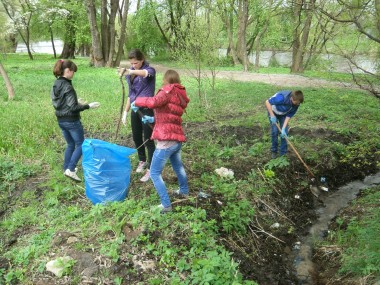The National Forum of UNDP Partner Municipalities and Project Municipal Governance and Sustainable Development Programme (UNDP/MGSDP) closing conference convened with more than 70 participants. Among the participants were city mayors and deputies, representatives of the Parliamentary Committee on State Building and Local Self-Governance and Administration of the President of Ukraine, experts from UNDP and other international organisations. The participants discussed the Project`s results and best practices as well as the prospects of local self-governance reform, decentralisation and sustainable development pathways for Ukrainian municipalities.
This UNDP Project, which concludes this July, has been underway for 9 years. As a result, 29 partner municipalities have been able to strengthen cooperation with local communities through joint efforts to improve the living conditions of their citizens. The Project worked at community, municipality and national levels.
Opening the press-conference UN Resident Coordinator and UNDP Resident Representative Alessandta Tissot underlined: "What makes us especially proud is that approaches promoted by the UNDP/MGSDP, in particular community-based development, collaborative policy making and community projects’ co-financing have been internalized and institutionalized in partner municipalities".
Director of Ukrainian office of the Swiss Agency for Development and Cooperation Guido Beltrani commended UNDP/MGSDP for its contribution to empowering local and regional authorities to improve municipal services, in particular through introduction of e-governance, improving solid waste management system, renovating infrastructure and promoting Associations of Co-Owners of Multi-Apartment Buildings.
The Project helped numerous local communities throughout Ukraine to solve local problems together. During the Project period, local communities established 670 community-based organisations, which united more than 70,000 inhabitants of the cities and towns involved. With the Project’s support the communities implemented 309 local community projects aimed at rehabilitating local infrastructure and fostering sustainable local development. Total cost of these projects amounted to UAH 36,3 mln. Overall, their micro-projects have benefited more than 282,000 people. In addition, partner municipalities learned and adopted the community-based and citizen-centric approach to local development. Municipal Support Units have been established in all partner municipalities and the capacities of MSU staffs were developed through training, exposure visits and consultations.
Rivne municipality was the first to internalize the community-based approach to local development through adopting in 2009 the Municipal Sustainable Development Programme. The Programme’s foundation was its community-based approach and co-financing principle. In context of the Programme the municipality supports 30 community projects annually. In December 2012, the Programme was extended to 2017. After Rivne, the municipalities of Ivano-Frankivsk, Voznesensk, Dolyna and others also adopted local programmes based on Project mechanism.
A number of projects were implemented to improve the quality of municipal services provision. The quality management systems for municipal services provision in accordance to ISO 9001:2008 were introduced in Voznesensk, Kirovske, Novograd-Volynskiy, Lviv, Dolyna, Backchysaray. A “one-stop-shop” Centre for Administrative Services Provision was established in Voznesensk.
The Project actively introduced the elements of e-governance, information and communication technologies and social media into operation of the City Councils. As a result, city councils created interactive official web-sites and introduced e-document flow in Voznesensk and Dolyna. A crowdsourcing project, “ECOMISTO,” was piloted and mobile applications are being created on the operation of local self-governance bodies in Ivano-Frankivsk.
It is important that Project capacity development activities raised the professionalism of local government officials and community activists. Overall more than 15,000 people participated in 500 training activities on various aspects of decentralisation and effective local government, project management, establishing and operating the Apartment Building Co-owners Association (ACMHs), water resource education and management, HIV/AIDS prevention, and gender mainstreaming.
In cooperation with UNDP/MGSDP the Parliamentary Committee on State Construction and Local Self-Governance developed the draft law, On Amendments to the Law ‘On Bodies of Self-Organization of Population.’” In addition, Project local partners participated in discussion of the draft laws On amalgamation of Territorial Communities and On Service in Local Self-Governance Bodies in 2012.
On request of the Ministry of Regional Development, Construction and Housing and Municipal Economy of Ukraine, UNDP/MGSD developed two standard educational programmes aiming at qualifying managers of multi- apartment buildings and training for heads and / or board members of Associations of Co-Owners of Multi-Apartment Houses. On approval by the Ministry of Education, Youth and Sports of Ukraine and the Ministry of Regional Development, Construction and Housing and Communal Services of Ukraine, both educational programmes will be added to the list of main programmes, providing postgraduate education in Ukraine.
The lessons learned from the project are being used in the new EU/UNDP project Smart Practices for Oversight by Non-State Actors on Administrative Service Provision. In addition, starting 2014, with the support of EU, a large new project aimed at improving on energy efficiency in Ukrainian municipalities will be undertaken.
Lviv municipality became a partner of UNDP Project, Municipal Governance and Sustainable Development Programme in November 2006. At the request of Lviv City Council, UNDP/MGSDP conducted a number of seminars for representatives of ACMHs and initiative groups, which aimed to promote the establishment of ACMHs.
UNDP, in partnership with the Folke Bernadotte Academy (FBA, Sweden), introduced the project Measuring the Rule of Law in Public Administration in Lviv. Within the project, city council administration assessed its own procedures and services in one of the most problematic spheres in Ukrainian cities – the housing sector – in light of the six commonly accepted principles derived from international and human rights law: legality, accessibility, the right to be heard, the right to appeal, transparency and accountability.

















